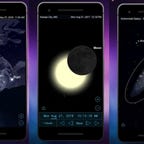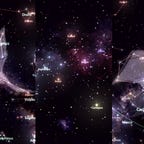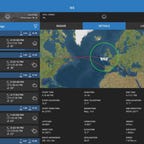7 Stargazing Apps for Spotting Constellations and More
These apps provide the astronomical maps you need to explore stars, planets and constellations -- and maybe even help you discover your own.
Our Picks
The night sky is magnificent and filled with so many things to discover. The best way to scope out the sky is with a little stargazing. Stargazing can be a relaxing activity, especially with a friend or partner. But to make the most of your experience by knowing where to look and what you're seeing, you need the help of an app. The best stargazing apps allow you to check out the celestial bodies and star clusters visible in a clear night sky. These stargazing apps can give you a better map of the sky and more details about what you're seeing.
My husband and I are far enough out in the country to see stars, but we haven't completely escaped the city's light pollution. Every so often before we turn in for the night, we'll step out onto the back porch if the sky is clear, and look up. We've seen a shockingly bright Venus, the ISS streak by and a few shooting stars -- thanks in part to help from some astronomy apps. If you want to take a look at some of the best stargazing app options, read on. These apps should help you spot planets, stars and constellations, and some of them have a free version.
Read more: Best Weather Apps of 2023
Google Sky lets you explore the reaches of space through the "eyes" of the Hubble Space Telescope, the Sloan Digital Sky Survey and the Digitized Sky Survey. You can explore the wealth of information available free on mobile or desktop.
Click through the tray at the bottom of the screen to learn more about the solar system, constellations, galaxies and nebulae, views of the universe in X-ray, ultraviolet and infrared. You can also use sliding bars to see drawings of the sky by Giovanni Maria Cassini.
Plus, find where the planets are in the sky at a given time by typing the name of a planet in the search box.
SkySafari
The SkySafari astronomy app, which starts at $2 on iOS and free on Android, lets you hold your phone to the sky to identify planets, constellations, stars and satellites. You can also use the app to see what the sky might've looked like thousands of years ago, or what it will look like in the future.
Simulate past meteor showers, approaching comets and celestial events, like eclipses. SkySafari also has a constellation illustration overlay feature in case you can't quite visualize the lion or bear that everyone else claims to see. The app also offers history, mythology and science information to accompany the images.
If you're not sure where to get started, you can tap Tonight's Best in the app to check out which object in the sky you could get the best look at.
Star Tracker
The Star Tracker app works on iOS (lite) and Android to show you 88 constellations, over 8,000 deep-sky objects, and the sun, moon and planets, all in real time. The app uses a 3D compass in AR mode that indicates the position of objects you've searched for. Think of it as a mobile planetarium.
To enhance constellations, Star Tracker has a graphics feature for the 12 zodiac signs and six famous deep-sky objects.
The app is free, but there's a full version with more features for $3 and a no ads version for $1. In addition, Star Tracker Pro offers a Time Machine feature and night mode.
International Space Station
The International Space Station (ISS) app, available free on iOS and Android, doesn't technically show you stars, but you can check out planets and the ISS itself. The app tracks where the in-space laboratory is currently located above the world at any given time.
Once you plug in your location -- the only permission the app asks for -- it can tell you how often you can expect to see the ISS in the sky. For example, residents of Louisville, Kentucky will typically be able to see the ISS between about 7:57 p.m. and 9:37 p.m. each night for about 30 seconds to a minute and a half. It's a fleeting window -- the ISS is traveling at about 17,100 miles per hour.
The app also keeps track of how long until the ISS will pass over your location again, and how long it'll be visible. On average, it looks like the ISS is visible in a given area one to two times per day over the course of a week.
Skyview
The Skyview app is $3 on iOS and $2 on Android, but both platforms have a free lite version. To use Skyview, just point your device at the sky and you can get started identifying galaxies, stars, constellations, planets -- even the International Space Station. The app has night mode and an AR feature, so you can use it comfortably any time.
The app's Sky Path's feature lets you track objects in space to see exact locations at any date and time. In addition, Skyview has a time travel option to observe what the sky looked like in the past and might look like in the future.
NASA
No at-home space adventure is complete without the free official NASA app, which you can download for iOS or Android. Although technically you can't use the app for stargazing in the same vein as some of the others on this list, you can still get up close and personal with space.
Check out a photo library with thousands of images constantly being updated and watch live NASA TV. In addition, the app has on-demand videos from around the agency and live streaming from the High-Definition Earth Viewing experiment on the ISS.
The app also keeps you in the know about NASA missions, launch information, upcoming sightings, news and tweets from the agency.
Star Walk 2
Star Walk 2, $3 for iOS and free for Android with in-app purchases, uses your phone's sensors and GPS to show you a map of the night sky in real time, pinpointing the location of stars, planets, constellations, comets, the ISS and satellites.
Like SkySafari, you can tap Visible Tonight if you're not sure where to start. The feature will tell you all upcoming astronomical events and celestial objects visible for your location. The What's New section will also keep you posted on upcoming events. You can also view the astronomy calendar or tap the clock-face icon to select any date and time and watch the sky of different periods.
More for skywatchers
- NASA's Incredible New Moon Map Will Serve as Blueprint for Human Missions" target="_blank
- Astronomers Discover Oldest Disk Galaxy Ever Hiding Deep in the Cosmos" target="_blank
- Scientists Spot 'One in a Million' Super-Earth" target="_blank
- Weird 'Cotton Candy' Planets Might Be Rocking Rings, Scientists Suggest" target="_blank
- Strange, Giant Exoplanet Could Be the Best Place to Look for Livable Exomoons" target="_blank
- Astronomers Watch Star Dance With a Black Hole, Proving Einstein Right (Again)" target="_blank
- 59 Weird Objects Seen on Mars, Explained
- A Giant Comet Spotted in 2017 Is Still Heading Toward Earth" target="_blank
- Cosmic Dead Ringers: 27 Super Strange-Looking Space Objects
- Astronomers Get First Look at a Baby Planet Being Born" target="_blank






